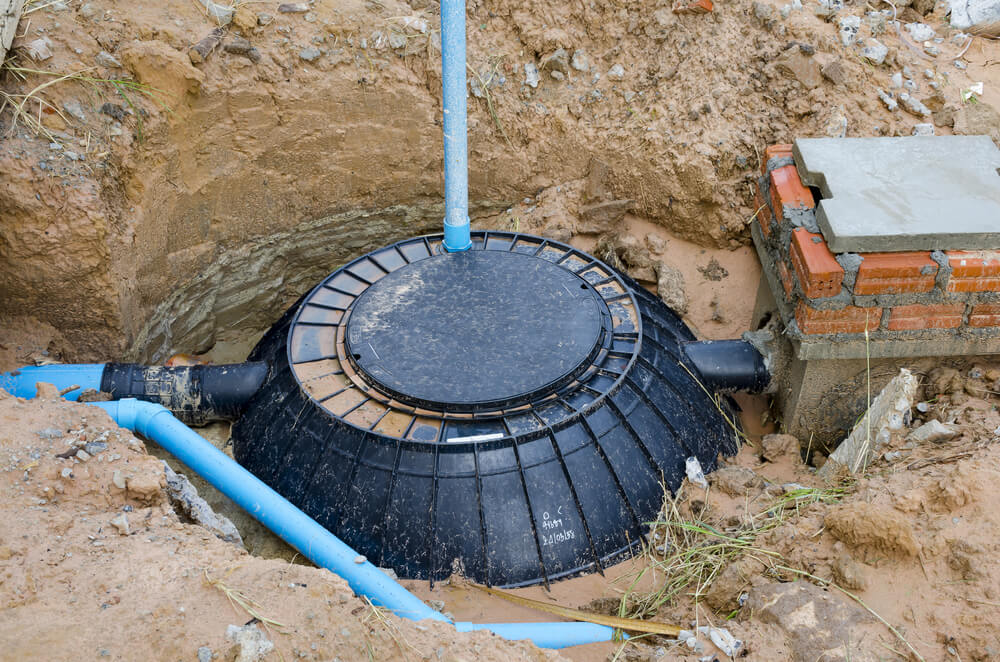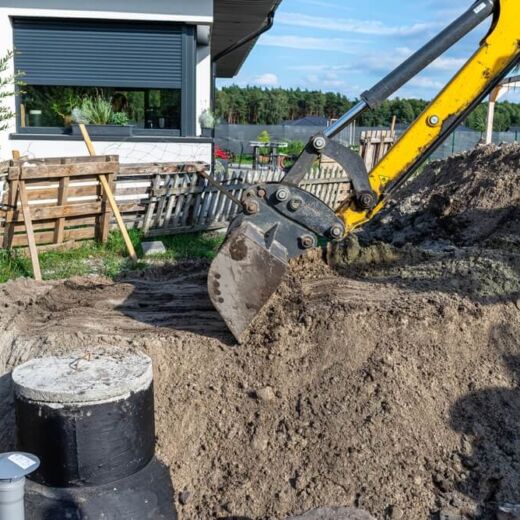When you’re in the market for a new septic system, whether for a brand new property or replacing your old system, knowing how to choose the right one can be challenging if you’ve never done it before. Here are the considerations for choosing the right septic tank system for you.
How Does a Septic System Work?
A septic system typically follows this process:
- All the wastewater from the home, including the kitchen, bathrooms, and laundry, is collected in the septic tank.
- The tank holds the wastewater so the solids can settle at the bottom, called sludge, and the oils and grease float to the top, called scum.
- Partially treated/separated wastewater goes to the drainage area.
- The wastewater percolates through the soil, being filtered by microorganisms, and the water gets recycled.
Septic Tank Considerations
Tank Size Requirements
When choosing the size of your septic tank, you need to consider factors like how big your property is, how many occupants are in your home, and how much water you expect to use. A septic tank holds all your home’s wastewater, so knowing approximately how much water you’ll use can help you choose the right tank size.
Having a septic tank installed that is too small can lead to odours, blockages and overflows, and a tank that is too big won’t work properly without enough water.
The Right Type of Septic System
Most homes need a septic tank system designed specifically for their needs, making each septic tank different. Your ideal septic tank design will work for your property and household needs. There are a few different types of septic systems. These include:
- Gravity design
- Mound septic design
- Intermittent sand filter system
- Recirculating sand filter system
- Fabric-wrapped pipe and open-bottom chambers septic system
- Evaporation septic design
- Decentralized wastewater septic system design
The septic system that will work best for you will depend on a few factors, including your soil type. For example, if your property has gravel or coarse soil, you’ll need a pressure-type design, or if you have dirt or rich soil, a gravity design is often best.
A septic system professional will be able to assist you with choosing the best septic system for your property.
Choose High-Quality Materials
The material of a septic tank plays a significant role in determining its efficiency and longevity. The most prevalent materials used for septic tanks include coated steel, fibreglass, concrete, and polyethylene.
Concrete tanks are quite robust and require cranes for their installation. Due to their weight, they are especially suitable for areas with water-saturated soils since they are less prone to floating. Concrete tanks can be fortified with additional materials to enhance their depth capacity.
In contrast, plastic tanks, such as those made from polyethylene, are lightweight, eliminating the need for heavy machinery during installation. Pre-fabrication ease means these plastic tanks can be manufactured beforehand and transported long distances.
It’s crucial to consider the potential chemical reactions that wastewater can induce in the tank materials. For example, sewer water often contains high levels of sulfuric acid and hydrogen sulphide, which can lead to corrosion in metal tanks. As a result, it’s advisable to opt for corrosion-resistant materials, like polyethylene and PVC, to ensure the tank’s longevity.
The Proper Pumping System
A pumping system is essential to remove waste from a septic tank efficiently. These systems can operate on various power sources, including gas or electricity, and each is best suited for a specific type of septic tank.
Sump pumps facilitate the movement of wastewater from the tank to the drainfield and are most effective in tanks with lower concentrations of solids. For homes equipped with aerobic septic tanks, high-head effluent pumps are recommended. These pumps exert greater pressure and utilize oxygen to break down solids in the wastewater.
Why is it Important to Have a Functioning Septic System?
A functioning septic system is crucial to a healthy household and the environment in Simcoe County. When wastewater comes from your plumbing, keeping it away from your home while it’s being treated protects your property from damage. It prevents you from being exposed to bacteria and pollutants.
A septic system has a lifespan of 20 to 40 years, and inevitably, all septic systems fail, but a well-designed septic system specific to your needs makes a massive difference in longevity. Ensure your septic system has regular inspections, get a septic alarm and pump it when required, and do not put chemicals or harmful fluids down your drains into your septic system.
Choosing the Right Septic System in Simcoe County
Simcoe County residents have many options when it comes to septic tank installation. When you choose Canadian Sanitation, you can expect technical expertise, professional opinions and a genuine concern for your home and septic system. We’re trained to provide comprehensive solutions to all your septic issues. Your rural property requires a unique understanding and high-quality service.
Choosing Canadian Sanitation means you get professionalism, a knowledgeable team, honest communication and no hidden cost. Our superior designs are built to last, so when choosing the right septic system, we can help every step of the way.




